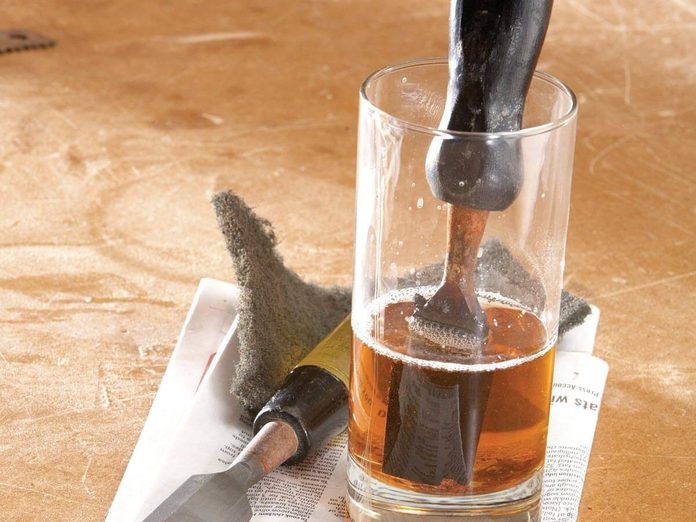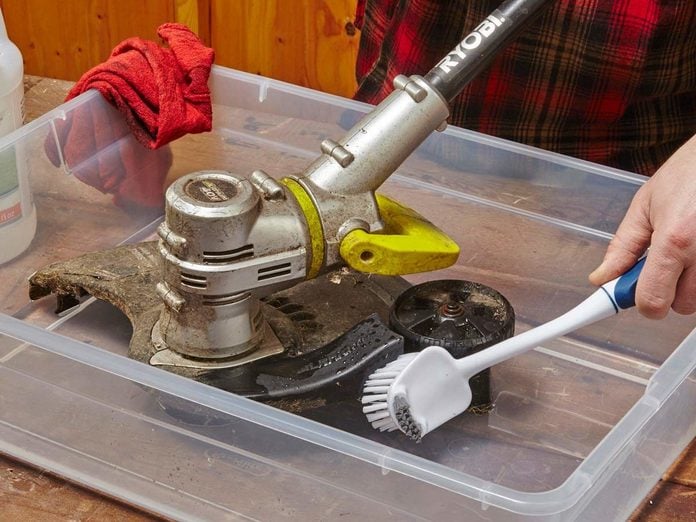Vinegar is a natural cleaning solution that yields numerous benefits in and around your home — and it's so cheap!

11 Vinegar Cleaning Hacks That Will Save You Time and Money


Clean Rusty Tools With Vinegar
Vinegar is useful in all kinds of cleaning hacks because it can make short work of hard jobs. Catherine Miller found a much easier way to clean rusty tools than scraping and sanding them. She poured white vinegar into a tin can (we used glass) and put a rusty wood chisel in the vinegar to soak overnight.
The next day, with the help of a Scotch-Brite pad, all the rust came off with little effort. The blade still needed sharpening, but the chisel was almost as good as new. Catherine wraps larger tools in a vinegar-soaked rag, covers the rag with a plastic bag or plastic wrap and then leaves it for 24 hours. After cleaning off the rust, you just rinse the tool in the clear water and wipe it dry.

Get Rid of Salt Residue on Shoes
You can clean off the residue quickly with a simple solution you can make at home. Fill a spray bottle with water and add a couple of tablespoons of white vinegar. Shake it up and spritz the mixture onto a clean paper towel. Gently wipe your shoes and watch the salt residue disappear. Keep the spray bottle near your shoe collection so you can clean off your shoes as the season goes.

Homemade All-Purpose Cleaner
Try using this homemade all-purpose cleaning solution on countertops and surfaces to disinfect and freshen your home. The recipe includes vinegar, which removes stains and odors, plus anti-microbial essential oils to keep your home germ free.

Vinegar Gets the Gunk
I like to keep my lawn equipment really clean. For items like my string trimmer, I simply scrub off all the muck with an old dish brush and white vinegar. It takes about 15 minutes for my string trimmer to go from drab to fab. — Richard Johnson

Add Vinegar to Your Dishwasher
Here’s one of the easiest vinegar hacks! Use vinegar in your dishwasher to give your glassware an extra sparkle and prevent filmy residue from hard water.
To give this trick a whirl, make sure your dishwasher is full — the best and most environmentally conscious way to go — then grab a small bowl that’s dishwasher safe. Pour it half full of white vinegar and stabilize it in the top rack. To avoid damage to the dishwasher’s gaskets, don’t pour the vinegar directly into the rinse aid compartment. Then add dishwasher soap and run a regular cycle.
From its top-tier position, the vinegar should evenly distribute among both levels. Then remove and enjoy your gleaming glassware.

Simple Cleaner Soft Scrub
Industrial soft scrub cleaners can contain strong chemical ingredients, but you can get your tub and shower just as clean with a homemade cleaner which will clean a bathroom faster and better. Most recipes use a mixture of baking soda and vinegar, which dissolves hard mineral deposits and easily cuts through soap scum.

Natural Toilet Bowl Cleaner
Many commercial toilet bowl cleaners use chlorine bleach, but you can clean your toilet without them. Plus, when you opt for vinegar, you won’t have to worry about accidentally exposing your pets or children to toxic toilet water.

Lemon and Vinegar Cleaner
Skip the expensive store-bought surface cleaners and make an all-purpose homemade cleaning solution using vinegar. Just mix one part distilled white vinegar, two parts water and a squeeze of lemon juice. This homemade cleaner works in the kitchen, bathroom and on floors. You can add a little baking soda to help whiten grout and sinks, just rinse with water after scrubbing.

Homemade Window Cleaner
Forget using chemical cleaners to wash windows. They’ll look clean as a whistle with an all-natural homemade window cleaner which uses vinegar and cornstarch to buff those fingerprints away.

An Old School Remedy
A little research will show you that cleaning wood floors with white vinegar and water is one of those cleaning hacks that is highly contested. But, it’s definitely worth a try if you’re looking to avoid harmful chemicals.
Depending on the strength of acetic acid (the chemical component in vinegar that breaks down oils and sugars) you’re looking to apply to your floors, go for anywhere from a half cup to a full cup of vinegar per gallon of water. Another plus? If you’re into natural remedies, you likely already have a variety of vinegars in your cabinet or refrigerator (but probably avoid the red wine variety).

Clean Grease
Vinegar (acetic acid) cuts grease and doesn’t streak, which makes it ideal for cleaning glass. We recommend a solution of 50 percent white vinegar and 50 percent tap water.



















